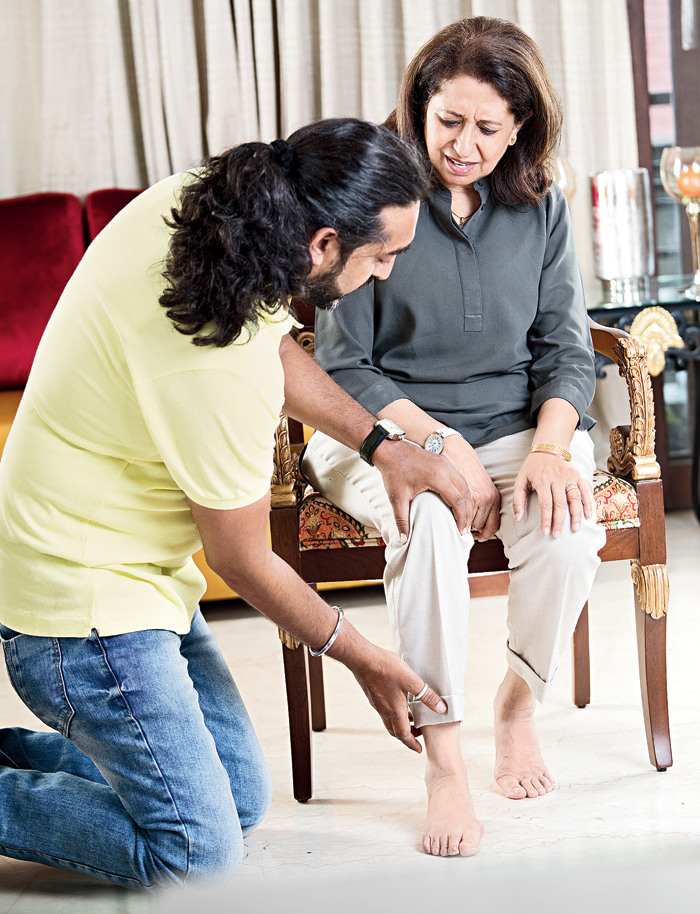With growing life expectancy across the world, people are living into their 70s and well beyond. According to the World Health Organization’s (WHO) Global Health and Aging Report, the number of people aged 65 and older is projected to grow from an estimated 524 million in 2010 to nearly 1.5 billion in 2050, with most of the increase in developing countries.
Unlike in the West, the majority of families in poor countries such as India cannot afford professional caregivers for the elderly. Neither do they want to send them to so-called old age homes. The elderly too prefer to stay at home, where they feel secure. But senior care is one of the most demanding and stressful jobs. Caregivers need oodles of patience.
In India, people are counted as senior citizens when they turn 60 but the symptoms of old age don’t begin to show until 65. Poor mobility, vision and hearing, apart from the inability to digest food properly, are some signs. The most common diseases are Alzheimer’s, osteoarthritis, osteoporosis, cognitive failure, cataract, enlargement of prostate gland, incontinence, falls, depression and cancer. Diabetes, ischemic heart disease, hypertension and stroke are, of course, some of the disorders that appear pretty early.
The elderly are more vulnerable to infections of the respiratory and digestive tracts. Due to lowered immunity, not only can infections hit faster but diagnostic tests too often fail to detect them. “Cough and cold or fever in the elderly should not be neglected for more than a day. There could be severe infection in the body,” says Dr Mrinal Kanti Roy, professor of medicine at the National Medical College in Calcutta and an expert in geriatric treatment.
Degenerative diseases are another issue. Muscular degeneration can result in falls that lead to fatal injuries or permanent immobilisation. Women are more vulnerable due to osteoporosis. “Alzheimer’s, Parkinson’s are also caused by degeneration of cells,” adds Dr Roy.
It is best if a caregiver learns certain things from experts. Says Meena Ganesh, managing director and CEO of Portea Medical, a company that offers elder-care services, “People trained in geriatric care understand that older adults have a different physiology, and that the prevalence of certain syndromes increases with ageing.”
Along with the body, the memory too declines. The elderly often forget to take their medicines on time and it becomes a primary responsibility of the caregiver. People are usually suggested polypharmacy — the concurrent use of multiple medications. In elderly persons, this can lead to severe reactions. “Polypharmacy must be avoided in their treatment. Minimum drugs should be prescribed,” says Dr Roy.
Another common problem is constipation. “Their diet should have enough vegetables and fruits to add roughage and ease constipation,” suggests Dr Roy. To take care of incontinence, a caregiver must help them urinate every four hours. Water intake should be restricted from the evening so that they don’t have to wake up at night to urinate.
“The biggest problem of an elderly person is isolation and insecurity — both financial and physical. This often leads to depression,” says Dr Debashis Sanyal, professor and head of department of psychiatry, KPC Medical College, Calcutta. If the person has a family history of depression or diseases such as Parkinson’s that lead to depression, it can’t be prevented. If not, family members can prevent it by taking steps as soon as they see the early signs. “Self-neglect leading to death can also be prevented. The family physician is the best person to identify depression and take care,” adds Dr Sanyal.
The family can take easy steps to keep them cheerful. “Let your parents read the newspaper if they can. If they can’t, you can read for them. Try to have lunch or dinner with your parents, discuss different issues of society and nation, and respect their opinion. These things work as a morale booster,” says Dr Roy.
The elderly should be encouraged to exercise within permissible limits. A walk in a nearby park should be good for them as will meeting friends. “Chatting with peers or joining a laughing club can make the mind fresh and cheerful,” says Dr Roy.
Empathy and cooperation from society is required. This can add life to years, not years to the life of the elderly.










